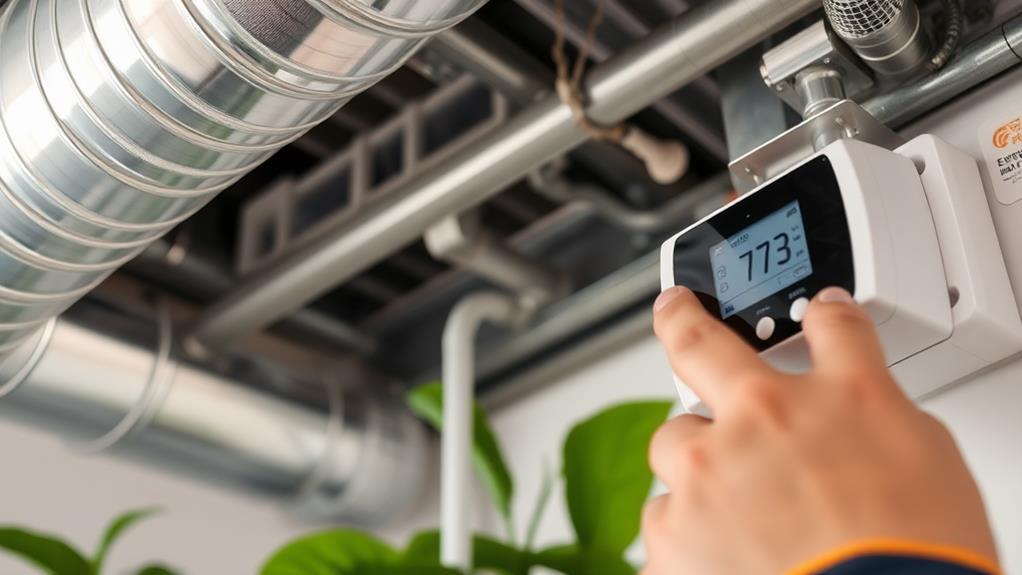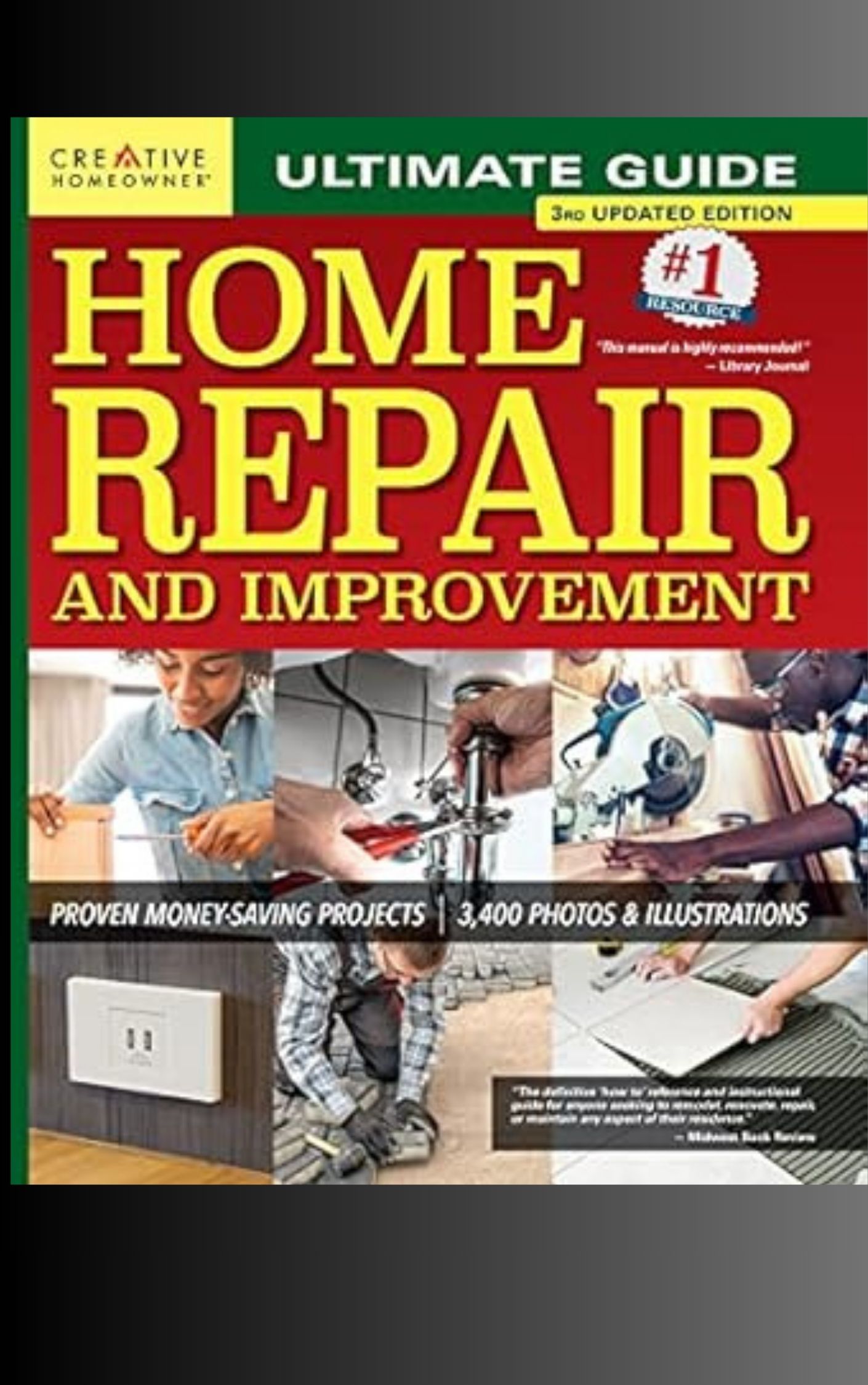Regular HVAC maintenance is crucial for maximizing energy efficiency in your home or business. By keeping your system clean and well-tuned, you'll reduce energy consumption by up to 30%, slash utility bills, and extend your equipment's lifespan. Proper maintenance prevents costly breakdowns, improves indoor air quality, and reduces your carbon footprint. It's not just about comfort—it's about smart energy management. From changing filters to scheduling professional tune-ups, consistent care ensures your HVAC system operates at peak performance. Don't wait for a breakdown to act; proactive maintenance is key to long-term savings and efficiency. Discover how a well-maintained HVAC system can transform your energy usage and comfort.
Understanding Your HVAC System
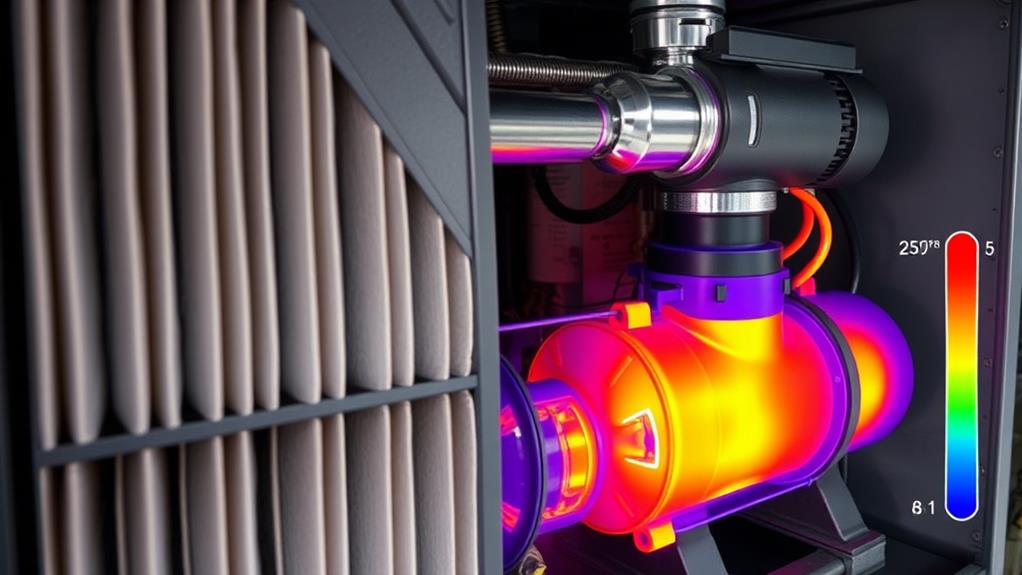
Nearly every homeowner relies on their HVAC system for comfort, but few truly understand how it works. Your HVAC system consists of several key components: the furnace, air conditioner, ductwork, thermostat, and various filters.
The furnace heats air and distributes it throughout your home, while the air conditioner cools and dehumidifies the air. Ductwork serves as the pathway for conditioned air to reach different rooms.
Your thermostat acts as the control center, allowing you to set desired temperatures and schedules. It communicates with the furnace and air conditioner to maintain comfort levels. Filters play a crucial role in trapping dust, allergens, and other particles, ensuring clean air circulation.
Understanding these components helps you recognize potential issues and maintain your system effectively. Pay attention to unusual noises, inconsistent temperatures, or sudden increases in energy bills. These can indicate problems with specific parts of your HVAC system.
Familiarize yourself with your system's make and model, and keep the user manual handy for reference. This knowledge will empower you to communicate more effectively with HVAC professionals and make informed decisions about maintenance and repairs.
Energy Efficiency Basics
The foundation of HVAC energy efficiency lies in understanding how your system uses energy and where improvements can be made. Your HVAC system consumes a significant portion of your home's energy, typically accounting for about 50% of your energy bills.
To optimize efficiency, focus on three key areas: proper insulation, regular maintenance, and smart thermostat usage.
Insulation plays a crucial role in maintaining indoor temperatures. Ensure your home is well-insulated, particularly in the attic, walls, and around windows and doors. This prevents heat transfer and reduces the workload on your HVAC system.
Regular maintenance is essential for peak performance. Clean or replace air filters monthly, keep outdoor units free of debris, and schedule professional tune-ups twice a year. These steps help your system run smoothly and efficiently.
Smart thermostats can significantly reduce energy consumption. They allow you to program temperature settings based on your schedule and automatically adjust for optimal efficiency. Some models even learn your preferences and habits, further improving energy savings.
Cost Savings of Regular Maintenance
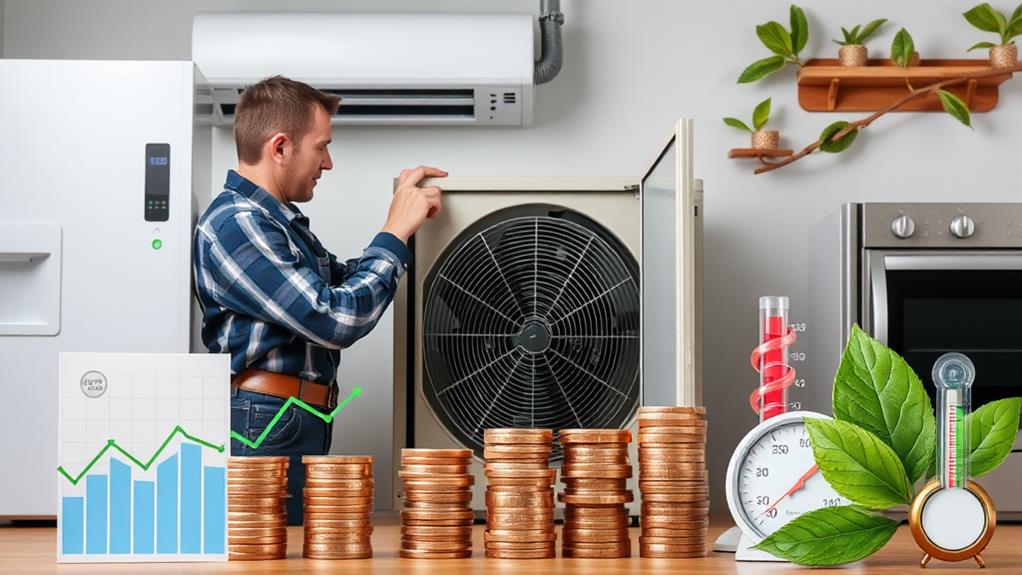
Regular maintenance of your HVAC system doesn't just improve efficiency; it also leads to significant cost savings over time. By keeping your system in top condition, you'll reduce energy consumption, which directly translates to lower utility bills. A well-maintained HVAC unit can save you up to 30% on your energy costs compared to a neglected system.
Routine maintenance prevents costly breakdowns and extends your system's lifespan. You'll avoid expensive emergency repairs and premature replacement of your HVAC unit. Regular tune-ups can identify minor issues before they escalate into major problems, saving you money on parts and labor.
Moreover, a properly maintained system operates more efficiently, reducing wear and tear on components. This efficiency means your HVAC doesn't have to work as hard to maintain desired temperatures, further lowering energy costs and prolonging the life of your equipment.
Environmental Impact of HVAC Care
Proper HVAC maintenance plays a crucial role in reducing your carbon footprint. When you keep your heating, ventilation, and air conditioning systems in top condition, you're not just saving money; you're also helping the environment. Well-maintained HVAC systems consume less energy, which means fewer greenhouse gas emissions from power plants.
Regular care of your HVAC system prevents refrigerant leaks, which can be particularly harmful to the ozone layer. By addressing leaks promptly, you're protecting the atmosphere from these potent greenhouse gases. Additionally, clean filters and coils improve air quality, reducing the need for air purifiers and their associated energy consumption.
Efficient HVAC systems also put less strain on the power grid, especially during peak usage times. This can help prevent blackouts and reduce the need for additional power plants. By extending the lifespan of your HVAC equipment through proper maintenance, you're also reducing waste in landfills. Fewer replacements mean less manufacturing and transportation of new units, further decreasing your environmental impact. Ultimately, your commitment to HVAC care contributes to a more sustainable future.
Common HVAC Efficiency Issues
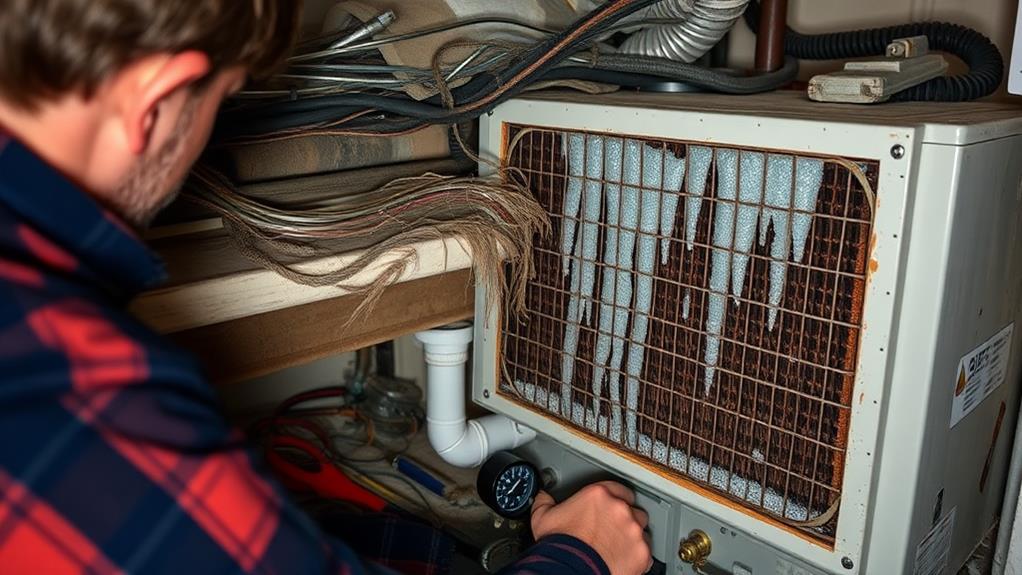
While maintaining your HVAC system benefits the environment, it's important to recognize common efficiency issues that can undermine these efforts. Dirty air filters are a primary culprit, restricting airflow and forcing your system to work harder. You'll also want to check for leaky ductwork, which can waste up to 30% of your conditioned air. Thermostat malfunctions or improper settings can lead to unnecessary cycling, increasing energy consumption.
Another common issue is inadequate insulation, causing your HVAC system to overcompensate for heat loss or gain. Refrigerant leaks in air conditioning units not only reduce efficiency but can also harm the environment. Neglected outdoor units often suffer from debris buildup, hindering heat exchange and straining the system.
Outdated or oversized equipment is a less obvious but significant problem. Older systems lack modern energy-saving features, while oversized units cycle on and off too frequently, wasting energy and providing inconsistent comfort. Finally, blocked vents and registers impede airflow, creating pressure imbalances that force your system to work harder. By addressing these issues promptly, you'll maintain optimal HVAC efficiency and minimize your environmental impact.
DIY Maintenance Tips
To keep your HVAC system running efficiently, you can perform several simple maintenance tasks yourself. Start by replacing or cleaning air filters monthly, as clogged filters force your system to work harder.
Next, clear debris from around your outdoor unit, ensuring at least two feet of clearance for optimal airflow. Regularly vacuum vents and registers to remove dust buildup, which can impede airflow and reduce efficiency.
Check your thermostat's accuracy by placing a thermometer nearby and comparing readings. If it's off, consider replacing it with a programmable or smart thermostat for better temperature control. Inspect exposed ductwork for leaks or damage, sealing any gaps with metal tape or mastic sealant.
Clean your air conditioner's evaporator coil annually using a soft brush and coil cleaner to improve heat transfer. Lubricate moving parts like fan motors and bearings with a few drops of oil to reduce friction and energy consumption. Lastly, test your system's drainage by pouring water into the condensate pan and ensuring it drains properly.
Professional Maintenance Checklist
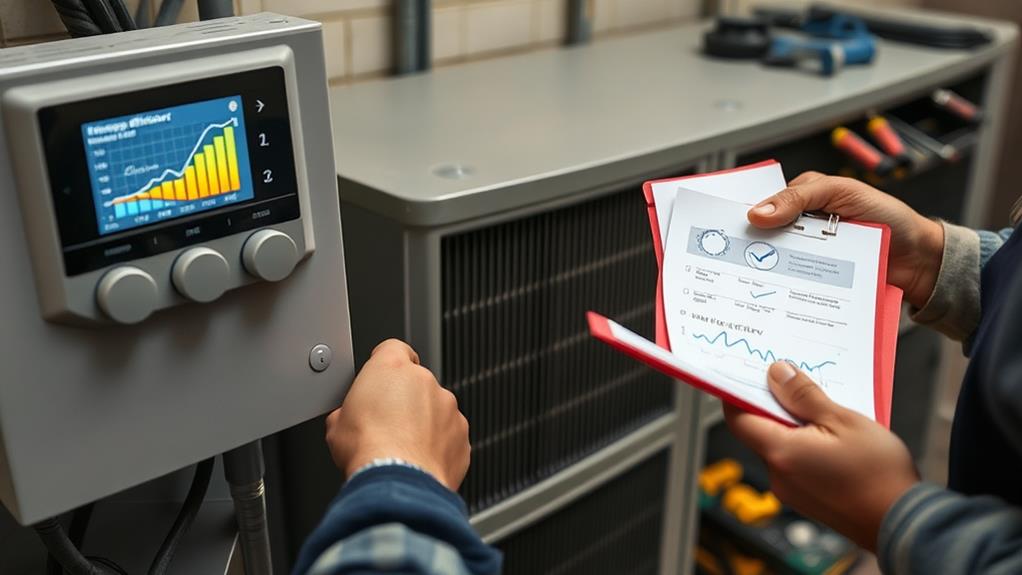
In addition to DIY maintenance, scheduling regular professional HVAC check-ups is crucial for optimal energy efficiency. A comprehensive professional maintenance checklist typically includes:
- Inspecting and cleaning the condenser and evaporator coils
- Checking refrigerant levels and recharging if necessary
- Calibrating the thermostat for accuracy
- Lubricating all moving parts to reduce friction
- Tightening electrical connections
- Examining the blower motor and belt
- Cleaning or replacing air filters
- Inspecting ductwork for leaks and sealing as needed
- Testing safety controls and startup/shutdown cycles
- Checking heat exchanger for cracks or corrosion
You'll benefit from having a professional technician perform these tasks annually or semi-annually, depending on your system's age and usage. They'll use specialized tools and expertise to identify potential issues before they become major problems. This proactive approach can extend your HVAC system's lifespan, improve its efficiency, and reduce energy costs.
Remember to ask your technician for a detailed report of their findings and any recommendations for system improvements or upgrades. By following this professional maintenance checklist, you'll ensure your HVAC system operates at peak efficiency year-round.
Long-Term Benefits of HVAC Upkeep
Dedication to regular HVAC maintenance yields substantial long-term benefits for homeowners and businesses alike. You'll experience improved energy efficiency, leading to significant cost savings on utility bills over time. Well-maintained systems operate at peak performance, reducing energy waste and lowering your carbon footprint. By preventing small issues from escalating into major problems, you'll avoid costly breakdowns and extend your HVAC system's lifespan, potentially saving thousands in premature replacement costs.
Regular maintenance also ensures consistent indoor comfort throughout the year. You'll enjoy more stable temperatures, improved air quality, and better humidity control. This enhanced comfort can boost productivity in workplaces and create a healthier living environment at home. Additionally, a properly maintained HVAC system increases your property's value, making it more attractive to potential buyers or tenants.
You'll also benefit from improved safety, as regular inspections can detect and prevent potential hazards like gas leaks or electrical issues. Ultimately, investing in HVAC upkeep provides peace of mind, knowing that your system is reliable, efficient, and ready to handle extreme weather conditions when you need it most.
Conclusion
You've learned how crucial regular HVAC maintenance is for energy efficiency. By keeping your system in top shape, you'll save money, reduce your environmental impact, and enjoy better comfort. Did you know that a well-maintained HVAC system can use up to 15% less energy than a neglected one? That's a significant difference in your utility bills. Don't overlook this important aspect of home care – it's an investment that pays off in multiple ways.
